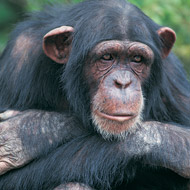
People with lower back pain may have similar spine shape to chimps
Scientists may finally have an answer to the age-old question: 'Is there a link between back problems and walking upright?' New research suggests the way we evolved plays a key role in lower back pain.
Humans are more commonly affected by back pain than any other primate, including our closest ape ancestor, the chimpanzee. However, despite being one of the most common human health complaints, the causes of many back problems are still poorly understood.
For the first time, researchers from Aberdeen, Canada and Iceland have found a link between spinal health and upright locomotion. Their findings suggest some people are less well adapted for walking upright.
Kimberly Plomp from the Simon Fraser University in Canada studies ancient human bones for signs of injury and disease. Two-dimensional shape studies were used to analyse the vertebrae of chimps, orang-utans and archaeological humans.
Some human vertebrae were found to have a lesion called a Schmorl's node, a small hernia found in the cartilaginous disc between the vertebrae. The spine shape of those humans with a Schmorl's node tended to be statistically indistinguishable from chimpanzee vertebrae, according to findings published in BMC Evolutionary Biology.
It is thought that humans and chimps split from a common ancestor around eight or nine million years ago, and some time after this, humans evolved to be bipedal - walking on two rear legs - whereas chimps became knuckle-walkers.
Mark Collard, also from Simon Fraser University and the University of Aberdeen, explained: "Our findings show that the vertebrae of humans with disc problems are closer in shape to those of our closest ape relatives, the chimpanzee, than are the vertebrae of humans without disc problems.
"As evolution occurred our vertebrae would have changed as we evolved from using some form of quadrupedal locomotion, using four legs, to bipedalism, using two legs."
However, "evolution is not perfect", Professor Collard added. Researchers believe some characteristics of the vertebrae could have remained within the human 'blueprint'.
"In short, our study suggests that the pathological vertebrae of some people may be less well adapted for walking upright."
In future, the team plan to use 3D shape studies of ancient and modern vertebrae to find out more about other spinal diseases, such as osteoarthritis.
The full study can be read at: http://www.biomedcentral.com/1471-2148/15/68



 The Veterinary Medicines Directorate (VMD) is inviting applications from veterinary students to attend a one-week extramural studies (EMS) placement in July 2026.
The Veterinary Medicines Directorate (VMD) is inviting applications from veterinary students to attend a one-week extramural studies (EMS) placement in July 2026.